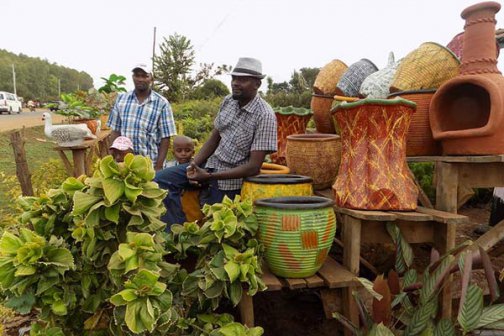What began as a curious membership to a newly formed group engaged in farming activities for a Form Four leaver would turn out to be the best decision of his life.
Benson Muchangi had just sat his Kenya Certificate of Secondary Education exam at Kamama Boys’ High School in Embu County, when his father Elias Njiru prodded him to join Kamviu Farmers Group that dealt in tree nurseries, livestock and bee keeping.
The group also taught farmers new farming skills and Muchangi learnt about seedlings’ nursery management. By virtue of his education and age, he was elected the secretary, an avenue that exposed him to growing and grafting of tree seedlings, spurring his love for conserving the environment.
About 14 years later, today Muchangi runs one of the largest nurseries near Ngurubani market along the Embu-Nairobi Highway in Kirinyaga County, getting customers from all over the country. His nursery has exotic, indigenous, ornamental and medicinal trees, flowers.
He also sells pots and vases for planting the flowers. Muchangi describes his job as rewarding financially and satisfying, as he gets an opportunity to conserve the environment.
He also has two parcels of land in Embu County; one at Kamviu and the other at home in Ngurubani where he grows and grafts seedlings, which he sells at the local market. It is easy to spot the nursery due to the neatly arranged pots and vases, with beautiful decorations interspersing merrily with scenic flowers and evergreen tree seedlings.
“I deal in ornamental trees, mainly palm trees, Thika palm, travellers palm, dwarf cypress, crotons, among others. The exotic trees include fast selling ones such as gravelia robusta (mukima), siena siamea (munyukwe) and eucalyptus from South Africa,” Muchangi says.
He also deals in indigenous trees such as Mukoigo, Mwiria and Mugumo. His nursery is a one-stop shop since he also deals in fruit trees and sells mangoes, avocados, oranges, apples, lemons, guavas and strawberries.
Overtime, Muchangi noted customers would buy flowers then agonise on where to plant them, especially for those to be kept inside the house.
He thus researched and started stocking clay products moulded into various shapes such as pots, shoes and vases that are painted in various colours so that a buyer of flowers would not worry about where to plant them. This has set him apart from other florists, increasing the number of customers flocking to his nursery. Muchangi also sells chairs made from sticks sourced from Ishiara in semi-arid parts of Embu to complement the needs of a customer who prefers to put up a shed outside a house.
Tree nurseries require a lot of water, which Muchangi taps from the numerous canals in Mwea Irrigation Scheme and pipes to his work station. Currently, he has grafted seedlings of avocado (10,000 seedlings), mango (20,000), apple (5,000), and orange (15,000). He started the Mwea nursery in 2012 and makes a profit of about Sh 50,000 monthly and is planning to set base in other counties.
The success of the nursery has enabled him to put up a hardware, buy a pick-up vehicle to run his business errands, buy an acre parcel of land and provide for his family’s daily needs. But it his deep love for conserving the environment that makes him proud of his job as well as being grateful to his father for encouraging him to join the farmers group.
While he was the farmers’ group secretary, Muchangi’s industriousness led a member into introducing him to the Green Belt Movement, then led by environmentalist Wangari Maathai, who is now the late. He became a volunteer in the movement and was assigned more roles three months later. He would move all over the county spearheading environmental conservation campaigns, especially tree planting.
“During this period, together with other volunteers, we planted tens of thousands of trees in Magacha and Njukiini forests to replace those that were illegally logged,” he says.
It was not easy, considering the pay was not much and would come late, but the passion he had for trees kept him going.
“The movement offered a stipend once a seedling had firmed as a young tree. I soldiered on as I felt motivated seeing a seedling firm up and grow into a young tree. I also met Prof Maathai who encouraged and mentored me,” Muchangi says. This love for trees was so intense that even after later landing a job with a retail chain and a hotel, he quit on realising they were not as satisfying.
His efforts were generously rewarded when he applied and qualified for a contract with the International Fund for Agriculture Development and Mt Kenya East Pilot Project. He was to plant trees along River Kirurumwe and Ena using seedlings he grew at home. He planted 80,000 trees and was paid Sh10 per seedling, making Sh800,000.









